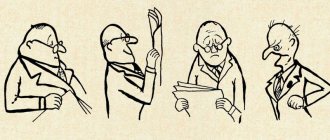Not all people have a stable psyche. An individual who has an unstable mental state is called hyperthymic or hyperthymic personality. Its weakness is the high risk of psychopathy under the influence of stress or psychological trauma. However, this type also has many good qualities that are important for successful communication with others and interaction with the world.
Such people are very interesting
The concept of “psychotype”
Each person is unique with their own set of psychological characteristics. But at the same time, such diversity does not at all exclude the presence of similarities between people. Having their differences, they can be conditionally combined into certain aggregates. Within each such group, its members will have more similarities with each other than with representatives of other similar associations.
Despite the fact that each person reacts to certain situations in his own way, there is a certain algorithm of behavior, a pattern of actions that, at first glance, completely different people can follow. This is explained by the presence of such a phenomenon as psychological personality types.
Professional activity
Despite the active life position and the success that hyperteam achieves thanks to the irrepressible desire to act and develop, he still risks finding himself in a difficult situation, for example, bringing his business to bankruptcy.
And all because he rarely completes things. Usually he loses interest halfway through the journey, and then nothing can make him work on the previously assigned task.
Therefore, career achievements are not the result of his persistent and painstaking work, but what he receives because of his risk-taking. This means that he is able to put everything on the line, risking being left on the street if he loses. But if he wins, he will be incredibly lucky.
He cannot devote his entire life to one profession, and, especially, to one place. Having studied one area, he loses interest in it and immediately switches to a completely opposite industry, deciding to try himself in a new business. And, most surprisingly, he manages to get the desired result.
Personality types
Psychological personality types can be divided into subtypes and types, but still experts identify eight main psychotypes.
- Schizoid personality type. Representatives of this group are not inclined to perform heroic or spontaneous actions; they think more than they do; they try not to stand out in any way and remain quite happy if they are not noticed and not disturbed over trifles.
- Hysterical personality type. Such people always stand out in the crowd. This applies both to appearance (bright clothes, unusual hairstyle) and to actions and lifestyle (tendency to creativity and rebellion).
- Epileptoid personality type. Calculating, scrupulous, pedantic, selfish. They always insist that they are right, and if confronted they can suddenly become aggressive.
- Hyperthymic personality type. Owners of this type have pronounced leadership qualities, are able to think outside the box, and have a tendency to act rashly.
- Asthenic personality type. Such people are characterized by excessive modesty, bordering on complexes. This quality gives rise to self-doubt and isolation.
- Labile personality type. The mood and behavior of representatives of this psychotype can change every minute. They are very emotional, all their experiences (both positive and negative) have a very high amplitude.
- Sensitive personality type. The most characteristic quality of such people is touchiness. They can get upset over little things, are unable to defend their point of view, and have a huge number of complexes.
- Unstable personality type. Driven, infantile people who do not want to prove anything to anyone, “going with the flow.” Under the influence of other people, they can freely change their point of view on any, even very important issue.
Characteristic
Activity and endurance are characteristic features of a hyperthymic personality.
From a psychological point of view, this type is considered unstable, with a predisposition to psychopathy and violence.
The strong features of hyperthyms include:
- endurance;
- activity;
- sociability;
- ability to inspire trust;
- the ability to get out of a difficult situation.
I bring to your attention the characteristic features of a hyperthymic personality.
- Egocentrism. There is a constant desire to take leadership positions. Such a person will try in any way to arouse interest in his person.
- Hyperthymia shows cheerfulness and optimism.
- Puberty that begins prematurely leads to excess sexual activity. An adult, even having started a family, continues to look for new sexual partners. Such an individual will always have an affair on the side.
- In the professional sphere they can achieve good results thanks to constant development and excess energy. Perseverance and resistance to stress help you cope with difficulties that arise at work.
- Such individuals are not used to living by the rules. Their irresponsibility and lack of diligence can lead to unconscious bad actions.
- Such people are sensual. They can think clearly and converse easily even with strangers.
- These individuals quickly make decisions, but, as a rule, they are thoughtless.
- If such a person is in a bad mood, then no one will even guess about it, because it will be disguised as jokes and fun.
- Hyperthym may be prevented from achieving good results by the presence of negative qualities. For example, their sociability can turn into excessive talkativeness, as well as intrusiveness. Not all organizations will accept an informal leader. A wild lifestyle can also have a negative impact on career growth and family relationships.
This type of personality can be seen using the example of the cartoon character Smeshariki - Crochet. This character demonstrates optimism and increased energy. In difficult situations, when other heroes give up, he copes with any problem, despite the superficiality of his knowledge. A good example of a person who has hyperthymic traits is the actor Jim Carrey. He never demonstrates his feelings or worries in public, he is always positive, smiling, strives to communicate, his facial expressions are very developed.
Psychological traits of owners of a hyperthymic personality type
A hyperthymic character leaves an imprint not only on a person’s behavior, but also largely determines the choice of profession and lifestyle. Domestic psychologists P.B. Gannushkin and G.E. Sukhareva studied in detail people of this type, to which they gave a more specific name “constitutionally excited.” They came to the conclusion that people with such a character are very sociable and lead an active lifestyle. Sometimes they are overly independent, overestimating their capabilities. Already in adolescence, hypertims strive to demonstrate their leadership qualities everywhere, both in the company of peers and older people. This often leads to their insubordination, for example, when communicating with parents or teachers.
The main feature of hyperthymic people is their almost constantly good, even elated, mood. But in rare cases, their “radiance” can be replaced by irritability, outbursts of anger and aggressiveness.
What should be understood by character accentuation?
Accentuation of character is an extreme variant of its norm, in which individual character traits are excessively strengthened, which reveals selective vulnerability to a certain kind of psychogenic influences with good and even increased resistance to others. (A. E. Lichko)
Characterological personality traits, depending on the situation, can develop in both a positive and negative direction, and can reach an extreme version of the norm, bordering on psychopathy. That is, accentuation is like a bridge between normality and pathology. Based on the degree of severity, accentuation can be hidden or obvious. People with such traits are called accentuated.
It is necessary to distinguish between accentuation and psychopathy. Psychopathy is a character pathology. A person cannot adequately adapt to the social environment; disharmony of character, temperament and behavior occurs. He cannot cope with life's difficulties, this causes severe neuropsychic stress, from which he suffers and the people around him suffer.
The classification of character accentuation is quite complex. The best known are the studies of K. Leonhard and A. Lichko; they seem to complement each other. I offer you the classification of a domestic psychiatrist, Doctor of Medical Sciences, Professor Alexander Evgenievich Lichko (1926 - 1994), which is used by specialists in psychological diagnostics.
Peculiarities of behavior of people with a hyperthymic psychotype
An uncontrollable desire for activity and for everything new and unknown often becomes the reason for indiscriminate choice of friends and acquaintances. Psychological studies show that alcoholics and drug addicts are quite common among hyperthymic people. This is one of the consequences of a violent reaction to hobbies. If passion is directed in the right direction, then such people can become bright creative individuals.
Another characteristic feature is high vitality. Some of the representatives of this psychotype, using this quality correctly, become very successful. But there are others who waste this energy on wasting their lives. Excessive self-confidence creates the illusion that everything will always be fine. As a result, a hyperthymic person can waste himself on a hectic, not always healthy lifestyle. But at the same time, it is deceptive to believe that at any moment he can change his life for the better.
Hyperthymic adults
The hyperthymic psychotype is a holiday person or a hurricane person who is able to come up with an entertaining scenario for the current evening in a matter of minutes and then turn the plans into reality. You won't be bored with him, because wasting time is not for him. He is too active to sit back and miss opportunities for new achievements. If you need advice, contact Hyperteam, because he always has several options for winning strategies. External signs:
- Intense gestures.
- Expressive facial expressions.
- Fast, competent speech.
- Commitment to fashion trends in clothing, hairstyle, image.
- Blooming, healthy appearance.
They make decisions quickly. They don’t need time to “wind up” before doing a difficult task. They immediately go on the attack, using diverse methods and means to achieve the goal. Some frivolity helps you not get hung up on problems, which contributes to success in most cases.
Having climbed to the very top of the career ladder, they usually do not linger in the corridors of power. They are hampered by a too superficial attitude towards life, neglect of generally accepted principles and standards. They lack seriousness. In fact, until old age, they remain children who are not afraid of failures, recklessly rush to the embrasures and immediately forget why they started the offensive, switching to a new task.
Hyperthymic personality type: classification
Extremes in the behavior and lifestyle of hyperthymic people really do occur. The differences between them are determined by divisions within the psychotype, which is especially evident in adolescence during the formation of personal qualities.
The hyperthymic-unstable character type is the most common. These are easily captivated people who can be easily convinced of anything. Moreover, they will defend even a completely absurd point of view with great zeal if they themselves are confident in it. And it will not be difficult to impose this point of view on unstable hypertims
The hyperthymic-hysteroid type does not appear so often. From the name it is clear that such people have both hyperthymic and hysteroidal traits in their character.
The hyperthymic-affective type is characterized by increased manifestation of affective outbursts of irritability and anger, which especially often arise when obstacles arise in the lives of such people or failures occur.
Kinds
Pure hyperthymia is extremely rare. Most often, mixed psychotypes are observed. This character accentuation remains the leading one, but additional ones from others are mixed in with it. The result is the following variations.
Unstable:
- entertainment comes first;
- immorality;
- possible criminal activity, alcoholism, drug addiction;
- constant job change.
Hysterical:
- unstable to stress;
- subject to severe emotional shocks;
- considers himself unsurpassed and most worthy;
- loves to be the center of attention.
Affective:
- hot-tempered;
- aggressive;
- hostile;
- conflictual.
Cyclical:
- cyclical mood swings;
- heightened self-esteem;
- familiarity;
- tendency to depression;
- illegibility in contacts.
It is much more difficult for psychologists to work with mixed types than, for example, with pure hyperthym. We have to take into account the characteristics of two characters at once.
What causes hyperthymic activity?
The main factor is the type of nervous system. Excitation processes dominate over inhibition processes. Hyperthymia simply physically cannot stop or slow down. He is always wound up and tense.
Additional factors that enhance character accentuation:
- heredity;
- upbringing;
- environment;
- education;
- personal beliefs, value system;
- character type (sanguine, phlegmatic, etc.);
- mental illnesses.
The last factor is of particular importance. In psychotherapy, they even distinguish a hyperthymic type of psychopathy, when the patient is in a constantly excited state, does not recognize the diagnosis, refuses to be treated and deliberately violates all instructions. Such patients are classified as violent and require special attention.
Hyperthymic teenagers
The main features of such individuals are the desire for leadership, flexibility after violent conflicts, lack of timidity in communicating with others, and a desire for adventure and risky behavior. Hyperthymic personality type in adolescents often becomes the cause of excessive independence and indiscriminate sociability.
In studies, if you have good abilities, success is possible, but at the same time, restlessness, distractibility, carelessness and indiscipline can become the reasons for uneven academic performance.
A hypertensive teenager is often unable to be thorough in his work, especially monotonous work. They are very burdened by monotonous activities. Situations that require speed, courage and resourcefulness are resolved by such boys and girls with ease and success. Their indignation is often expressed in violent scenes of anger; they are especially irritated by the opposition of others, the obvious suppression of intentions, a strictly regulated disciplinary regime, limited communication with peers, and the lack of opportunities to express their restless energy.
P.B. Gannushkin (1933) gave this type the name “constitutionally excited” and included it in the group of cycloids. However, this type was not subsequently identified in Soviet psychiatric literature and was usually included in the broader group of “excitables” [Kerbikov O.V., 1962].
Information from relatives indicates that from childhood, hyperthymic adolescents are characterized by great mobility, sociability, talkativeness, excessive independence, a tendency to mischief, and a lack of a sense of distance in relation to adults. From the first years of life, they make a lot of noise everywhere, love the company of their peers and strive to command them. Teachers of children's institutions complain about their restlessness. However, only in very rare cases is excitability in childhood so strong that it forces you to consult a doctor.
The first difficulties may appear when entering school. With good abilities, a lively mind, the ability to grasp everything on the fly, restlessness, distractibility, and lack of discipline are revealed. Therefore, they study very unevenly - sometimes they show off A’s, sometimes they “get” D’s. During puberty, motor excitability may smooth out, but character traits become even more pronounced.
The main feature of hyperthymic teenagers is almost always a very good, high spirits. Only occasionally and for a short time is this sunshine darkened by outbursts of irritation, anger, and aggression. The reason for indignation is usually opposition from others, the desire on the part of the latter to suppress too harshly the desires and intentions of a teenager, to subordinate him to someone else's will. Sometimes the reason for irritation is the awareness of too obvious one’s own mistakes and failures. Outbursts of irritation and anger become more frequent and intensified in a situation of a strictly regulated disciplinary regime, which hyperthymic adolescents tolerate very poorly, and also when they find themselves alone, deprived of society, wide contacts with peers, and the opportunity to apply the energy splashing out of them somewhere.
A good mood is harmoniously combined with excellent health, high vitality, and often a blooming appearance. They always have a good appetite and healthy sleep. Although they often sleep little, they get up cheerful in the morning. Under heavy physical exertion, lack of sleep, or in a tense situation that requires activity, energy, and resourcefulness, they retain strength for quite a long time. However, mental stress combined with forced idleness is poorly tolerated.
Acceleration in relation to general physical and sexual development is usually pronounced. By the age of 15-16, you can often see a fully formed adult figure.
Specific adolescent behavioral reactions in hyperthymic adolescents are quite pronounced. Due to the reaction of emancipation, conflicts easily arise with parents, teachers, and educators. This is led to by petty control, everyday obsessive care, constant instructions and moralizing, “working through” in the family and at peer meetings. All these measures usually only cause an increase in the “struggle for independence,” disobedience, and even a deliberate violation of rules and regulations. Trying to escape from the care of the family, hyperthymic teenagers willingly go to camps, go on tourist trips, etc., but even there they soon come into conflict with the established regime and discipline. As a rule, there is a tendency to unauthorized absences, sometimes for long periods. Real escapes from home are rare among hyperthymic people. And if they decide to escape, they tend to encourage one of their friends to escape in order to have a traveling companion. During escapes, their tirelessness, their ability not to get lost in unfamiliar places and unusual situations, to quickly establish contacts with strangers, to catch and dodge difficulties are especially evident. Attitudes towards rules and laws are less influenced by the emancipation reaction. It is more determined by frivolity than by the intention to violate them. The line between what is permitted and what is prohibited is visible. From their point of view, a tempting enterprise fully justifies “minor” run-ins with the law, and even the risk of being caught for obvious offenses.
The reaction of grouping is not only under the sign of constant attraction to peer companies, but also the desire for leadership in these companies. This desire is revealed as soon as the hyperthymic teenager has become at least a little accustomed to the society where he finds himself. When it comes to leadership in informal peer groups, hypertims usually achieve success. Their ability to always be ahead, their fearless readiness to resist at any time if necessary, to get into a fight, to take risks, to play with danger - all this is valued by their peers, who often give them the word “groovy guy.” They are at their best in organizing entertainment, and in any emergency situations where speed, courage and resourcefulness are required, and in an environment of work excitement, “emergency work”, “assault” - everything that creates a favorable opportunity for revealing the positive sides of their character.
However, in a closed institution for teenagers, with a strict regime, restriction of new contacts and the need for many days of round-the-clock communication between a closed circle of people, the too vigorous energy of hyperthyms, their constant desire to interfere everywhere and command everyone, begin to weigh down their peers, who lose sympathy for them [Bizyuk A.P. ., 1972]. Reacting with violent outbursts to the protests of other teenagers provoked by their own restlessness, they begin to constantly create a thunderous atmosphere around themselves and lose their leadership role.
An uncontrollable interest in everything around makes hyperthymic teenagers indiscriminate in their choice of acquaintances. Contact with random people they meet is not a problem for them. Rushing to where “life is in full swing,” they can sometimes find themselves in an unfavorable environment and end up in an asocial group. Everywhere they quickly get used to it, adopt manners, customs, behavior, clothes, fashionable hobbies. However, energy and emotionality do not allow hyperthymic adolescents to isolate themselves only within the framework of the interests and life of one group. Their liveliness encourages them to pay attention to much that is happening around them. Nevertheless, with friends they easily indulge in entertainment, drinking, even dubious adventures.
Hyperthymic adolescents are prone to group forms of delinquent behavior. Often they themselves become the instigators of group crimes, to which
They are driven not only by the thirst for entertainment or the desire to obtain means of pleasure - the element of risk is also attractive to them. “Prestige” among asocial peers is even more important.
Alcoholization poses a serious danger for hyperthymic individuals from adolescence. They always drink in company with friends. They prefer shallow euphoric stages of intoxication, but easily fall into the path of frequent and even regular drinking.
If the opportunity arises, they may show interest in other intoxicating drugs, especially “fashionable” surrogates, reassuring themselves with the thought that “this won’t make you an alcoholic or drug addict.” And, indeed, they remain for a long time at the level of “group mental dependence” [Strogonov Yu. A. Kapanadze V. G., 1978], which does not reach the level of substance abuse, both in relation to alcohol and other intoxicating drugs.
The reaction of hobby in hyperthymic adolescents is distinguished by its richness and variety of manifestations, but most importantly, by the extreme inconsistency of the hobby. Collections give way to gambling, one sporting hobby to another, one club to another. Boys pay fleeting tribute to technical hobbies, girls to amateur artistic activities. With a constant desire to command their peers, leadership hobbies (the role of official organizers, physical organizers, cultural organizers, elders, etc.) also do not attract them for long. Official leadership in formalized groups, apparently, is associated not so much with team functions, but with the need to perform everyday petty, painstaking work that requires perseverance and accuracy. This kind of work is always difficult for hyperthymic teenagers.
Accuracy is by no means their distinguishing feature either in their activities, or in fulfilling promises, or, what is especially striking, in monetary matters. They do not know how to calculate and do not want to; they willingly take on debt, pushing aside the unpleasant thought of subsequent repayment. They love to show off and easily embark on dubious adventures. An illegal transaction or petty theft in their eyes often does not have the character of a serious offense.
Reactions associated with the formation of sexual desire usually manifest themselves quite clearly. Sexual feeling awakens early and is quite strong.
This, as well as the lack of shyness and ease of contacts, push for early sexual relationships. Although romantic love does happen, it usually doesn't last long. A desire quickly arises to have sexual intercourse with the object of love. If this fails, then the love soon cools down, and the attraction is satisfied through casual acquaintances. Masturbation, as a rule, does not escape boys of this type, and they are not averse to joint masturbation with peers. But they are not inclined to be satisfied with this form of sexual activity and are looking for full-fledged intercourse. There is no particular tendency towards transient teenage homosexuality and other deviations of sexual desire.
Always a good mood and high vitality create favorable conditions for reassessing your abilities and capabilities. Excessive self-confidence encourages you to show yourself, appear before others in a favorable light, and boast. The latter sometimes leaves a hysterical imprint on the behavior of hyperthymic adolescents. But they are characterized by sincerity of enthusiasm, real confidence in their abilities, and not a strained desire to “show themselves more than they really are.” Falsehood is not in itself an inherent trait. Their lies are dictated by the need to get out of a difficult situation or are based on mixing their own optimistic ideas with reality. Everything new - new people, new places, new objects - attracts them keenly due to sincere interest and the desire to use their strengths, and not with the goal of just impressing others. The outlook on one's own future, as a rule, is full of optimism, even in the absence of any grounds for this. Failures can cause a strong affective reaction, but do not unsettle one for a long time.
The self-esteem of hyperthymic adolescents is quite sincere. In cases of accentuation not accompanied by pronounced behavioral disorders, most character traits are well noticed. But even with decompensated psychopathy, the ability to see the main hyperthymic traits in oneself remains - sociability, high spirits, etc., intolerance of loneliness and critical remarks addressed to oneself, a tendency to draw one’s own a future in rosy colors, a passion for adventure and risk, the attractiveness of the “first role” in a dangerous situation. Hyperthymic teenagers admit to the ease with which they can violate generally accepted rules and even laws for “interesting” and “tempting” things, and that they retroactively reproach themselves for this. Some features that are common to the unstable type are conscientiously noted - drinking in cheerful companies, absenteeism for the purpose of having fun. At the same time, sometimes there is a desire to imagine oneself more conforming to the environment than it actually is. This especially applies to sexual problems and relationships with parents, but to some extent it may also apply to other relationships. For example, “I like to dress like everyone else” is a fairly common response from hyperthymic people when assessing their attitude towards clothing. However, a conformist teenager means by this the most established styles for young people, and a hyperthymic teenager means the latest fashion. In assessing money matters, there is also an intention to show oneself more “correct” than one actually is. The tendency to run away from failure is rejected, although this usually happens quite often.
P.B. Gannushkin (1933) believed that hyperthymia often does not reach the level of obvious psychopathy. According to G. E. Sukhareva (1959), pronounced forms of hyperthymic psychopathy under the age of 15 years are extremely rare. According to our data, at the age of 14-18 years, hyperthymic accentuations and psychopathy are common. Among male adolescents hospitalized in a psychiatric hospital who were diagnosed with psychopathy or characterized by character accentuation (see Table 3), 10% of psychopathy and 13% of character accentuation were regarded as representatives of this type. In the general population, hyperthymic accentuation is also quite common - it occurs in 8% of male and 3% of female adolescents [Ivanov N. Ya., 1976].
Andrey L, 17 years old Since childhood, I have witnessed constant scandals between my alcoholic father and my mother, a powerful and energetic woman. As he remembers, he always wanted to leave home. He was always of a cheerful disposition, noisy, and tried to command his peers. He was a mediocre student, finished 8th grade and went to work. , choosing his mother’s profession (became a men’s hairdresser). He is considered a good master of fashionable hairstyles, is popular among young people in his area, and earns good money. He has many friends and makes acquaintances easily and quickly. Rapid puberty was also noted earlier. From the age of 14, he had a secret sexual relationship with a middle-aged woman and regularly met with her. She recently married someone else - he quickly consoled himself, became interested in his classmate, and is going to marry her.
When he was 15 years old, one day he came home and found the corpse of his father hanging himself and his mother lying unconscious and covered in blood - before committing suicide, out of jealousy, his father inflicted a severe wound on her head with an ax. He bravely endured a difficult situation, showing resourcefulness and energy.
The mother, having recovered, soon married someone else. He established, in his words, an “indifferent relationship” with his stepfather. He began to take care of his younger 10-year-old brother, buys him clothes with his own money, and monitors his studies at school (“his mother took care of his stepfather”).
From the age of 15, I began to drink often in the company of friends - recently up to a liter of wine at one time.
He was taken to a psychiatric hospital by ambulance at night with a picture of delirium. I saw rats running around the doctor’s table, there seemed to be “hordes of bedbugs” on the bed, there was a “nylon mesh” in front of my eyes, I heard someone screaming, I always felt that there was a cigarette squeezed between my fingers, I pulled it to my mouth, but when looked at the hand, the cigarette disappeared. At the same time, he was completely oriented and, in the pauses between hallucinations, critically assessed them. The physical condition was quite satisfactory. Apart from moderate tachycardia (90 per minute), mild facial hyperemia and dilated pupils, there were no other somatic manifestations of delirium. After the injection of chlorpromazine, I slept for more than 12 hours and woke up in clear consciousness. He said that the night before he was drinking wine in the company of friends and, at the suggestion of one of them, took several pills (“I think they start with the letter C...”). Friends said that “they make all sorts of devilish things happen” - I wanted to experience it for myself. In the middle of the night I woke up from terrible dreams. Then it began to seem that the room was filled with rats and bedbugs - he began to rush around and scream. Was hospitalized.
From the words of the younger brother, it became known that in recent months he had come home with friends several times in his mother’s absence - they smoked some kind of “dope” together, covered their heads with a blanket and sniffed something, and then laughed and got mad. The younger brother did not tell his mother anything, since he received handouts for silence. After this information was received, he admitted that he sniffed stain remover, took diphenhydramine, seduxen and cyclodol. The motive was the desire to experience something unusual. I did this once or twice a week when “there was nothing to do.”
Survey using PDO. According to the objective assessment scale, hyperthymic-unstable type was diagnosed. There are no signs indicating the possibility of psychopathy. There is a tendency to dissimulation, delinquent behavior and alcoholism. The reaction of emancipation is moderate, conformity is average. According to the subjective assessment scale, self-esteem is good: he considers himself to be a hyperthymic and unstable type, rejects melancholic and asthenoneurotic traits. Diagnosis. Suffered from intoxication (cyclodol) delirium. Mentally healthy. Behavioral disorders against the background of hyperthymic type accentuation.
Follow-up after 2 years. Serving in the Army.
Hyperthymia in its pure form most often occurs in the form of a clear accentuation of character. Against its background, transient behavioral disorders may occur (delinquency, alcoholism, less often - escapes and vagrancy), as well as neurasthenic reactions of the hypersthenic type [Lichko A. E., 1976.].
The formation of hyperthymic type psychopathy most often occurs through psychopathic development. At the same time, some features of the hyperthymic type, which also exist in a less pronounced form when accentuated, begin to come to the fore, creating similarities with other types of psychopathy.
Hyperthymic-unstable type. Among the variants of the hyperthymic type, this is the most common. The thirst for entertainment, fun, and risky adventures increasingly pushes one to neglect classes and work, to alcoholism, sexual excesses and delinquency - ultimately, all this can lead to an antisocial lifestyle. The core of the personality still remains hyperthymic and, despite all the external similarities with unstable adolescents, such adolescents are always distinguished by high vitality, optimism, keen interest in new things and, most of all, an undying desire for leadership, the role of leader, ringleader, initiator of the most risky adventures. In psychopathization of the hyperthymic-unstable type, the family usually plays a decisive role. Both hypoprotection, neglect, and dominant hyperprotection, petty control and strict dictatorship, aggravating the emancipation reaction, and even combined with the dysfunction of intra-family relationships, contribute to the development of this type of psychopathy based on hyperthymic accentuation. This path of psychopathic development is described in more detail in Chapter. V.
The hyperthymic-hysterical type is distinguished by the predominance of such character traits as the desire to boast, impress, show off in front of others, and show off. Often a tendency to mystifications is revealed, played out with great imagination, ingenuity, artistry, and a subtle sense of the weaknesses of the persons being misled. If a hysterical psychopath in the process of such hoaxes prefers to act as a “soloist actor”, then with the hyperthymic-hysteroidal variant he prefers the role of a “director”, forcing others to act in accordance with his plans. When faced with life's difficulties, failures, desperate situations and the threat of serious punishment, a tendency to demonstrative behavior is revealed, even to the point of depicting suicide attempts.
The formation of this type also occurs along the path of psychopathic development. The most important factor here is another type of improper upbringing - pandering hyperprotection, the “family idol” (see Chapter V).
Vladimir A., 17 years old. There was always a tense situation in the family. The mother is 10 years older than the father, is jealous of him for no reason, and made scenes in the presence of her son: she sent the boy to spy on his father. The father is gentle, indulgent, good-natured. According to him, the boy “learned to manage his parents from childhood,” benefiting from his mother’s jealousy, receiving gifts from both her and his father. He was always distinguished by his lively disposition, activity, and was amused when people believed him.
I studied well, English came easily, and I quickly learned simple dialogues. I tried sambo and motorsports, but soon gave up - I got tired of it. After graduating from school, he intended to enter the Military Medical Academy.
While studying in the last year of school, he unexpectedly found himself left to his own devices for some time - when his mother was being treated in a sanatorium, his father was sent on an urgent business trip. I fell into a group of teenagers who were gathering near hotels. He pretended to be a tourist from Canada, spoke to them only in English, pretending that he didn’t understand anything in Russian. He misled them, but a few days later he was accidentally exposed. He continued to get to know them, began drinking and skipping classes. To get money for drinks, he began to engage in petty speculation with foreign tourists. He was caught doing this and was expelled from school just before the final exams. I went to work at the post office, hiding it from my new friends, I was ashamed of this work, which was not “valued” among them. I went to drink more and more often—almost a bottle of wine at a time, but only in “my own company.” Intoxication led to “stormy fun” - although he did not get into fights, he was detained by the police more than once for making noise in public places. Casual sexual relations appeared. A year later, during a city-wide celebration of high school graduates, envying those who had graduated, he “went on a spree” - wandered around the city for almost three days, having fun and drinking, sleeping in fits and starts with friends. He was fired from work for absenteeism. Received a warning from the police. Then he declared that he wanted to “be treated for alcoholism,” and willingly entered a psychiatric clinic.
The mood at the clinic is high, he tries to impress the staff, and sends notes to his friends written in English. He quickly got used to the situation, claims to be a leader among teenagers, and treats the weak and sick with disdain. He is verbose, tries to present himself in a favorable light. He tends to overestimate his abilities - although he hasn’t studied for a year, he believes that he can easily pass the 10th grade and enter the academy.
Signs of alcoholism, even early ones, have not been established.
Physical development with acceleration. Neurological examination revealed no abnormalities.
Survey using PDO. According to the objective assessment scale, the hyperthymic type was diagnosed. There were no signs indicating the possibility of psychopathy. Conformity is average, emancipation reaction is moderate. A psychological tendency towards delinquency and a pronounced tendency towards alcoholism were discovered. According to the subjective assessment scale, self-esteem is satisfactory: hyperthymic and unstable features are reliably identified, features of sensitive and epileptoid types are rejected.
Diagnosis. Mentally healthy. Behavioral disorders against the background of character accentuation of the hyperthymic-hysteroid type.
Follow-up after 2 years. He is not registered with the dispensary. I tried unsuccessfully to enter college after finishing night school. Drafted into the army.
Hyperthymic-explosive type. The main manifestation of this type is that the outbursts of irritation and anger inherent in hypertimics, when they encounter opposition or fail, become especially violent and arise at the slightest provocation. At the height of affect, control over one’s behavior may be lost, abuse and threats are released without taking into account the situation, in aggression one’s own strengths are not commensurate with the forces of the object of attack, and resistance can reach “violent madness.” Acute affective reactions are usually of an aggressive type, but auto-aggression is also possible. The similarity of the hyperthymic-explosive type with the explosiveness of epileptoids remains purely external. Hyperthyms are easy-going, they have the ability to easily forgive insults, even to make friends with those with whom they were recently in a quarrel; other epileptoid features are also absent. It is possible that traumatic brain injuries, even mild but repeated ones, can play a significant role in the formation of the hyperthymic-explosive type. This type of psychopathization may also be a consequence of the malignant course of manic-depressive psychosis, which began in adolescence.
Mikhail!., 15 years old. Father and mother are divorced - both suffer from alcoholism. Until the age of 7, he was raised in the village by his grandparents in good conditions. But already at the age of 6-7 he was distinguished by a violent disposition, disobedience, without permission he left with older children to distant villages, and did not return to spend the night. At the age of 7, he was taken to the city by his father and stepmother, who treated him harshly and severely punished him for his misdeeds. Despite his good abilities, he was reluctant to study at school. He played in the streets until late and, fearing punishment, spent the night in the front door more than once. I met the soldiers: I secretly snuck into their barracks to spend the night. He left school at the age of 11. Sent to a boarding school, he ran away from there. At home he began to get into fights with his stepmother. It was easy to make acquaintances. More than once I disappeared somewhere for 10-15 days. He lived secretly with some praying woman for about a month, then he robbed her and ran away. He was placed in a children's psychiatric hospital, from where he was discharged to his mother, who had stopped drinking at that time. He also ran away from her, stole sweets, food, cigarettes from stalls, and took small money from children. One night he stole 200 packs of cigarettes from the cupboard. In the morning I saw the barmaid crying; I felt sorry for her - he returned everything to her.
At the age of 12 - a skull injury with loss of consciousness. After this, he became very irritable, quick-tempered, easily gets into fights even with stronger teenagers, but at the same time quickly moves away. He was sent to a summer sports camp for troubled teenagers, ran away from there to the city, at night climbed onto the second floor of a winery using staples, stole 15 bottles of wine, brought them to the camp and treated them to a friend. He has been drinking since the age of 13 - up to a bottle of wine or a glass of vodka at one time.
After escaping from the camp, he was again sent to a psychiatric hospital. In the teenage department, at the slightest provocation, he got into fights with other teenagers, quarreled with the staff, and at the same time gave violent but short affective reactions. He is in high spirits almost all the time, nervous, butts in everywhere, thereby irritating other teenagers. Khoronya is physically developed. Easy to make contact. Doesn't want to study.
Neurological “microsymptoms”, vasomotor play, and pronounced dermographism were noted. EEG showed no significant changes.
Survey using PDO. Hyperthymic-unstable type was diagnosed. A high B-index was noted, indicating a possible change in character according to the organic type, as well as a high level of psychological tendency towards alcoholism and conformity. According to the subjective assessment scale, self-esteem is satisfactory: the features of emotional lability, hyperthymia and instability are highlighted, only melancholic features are denied.
Diagnosis. Psychopathy of the hyperthymic-explosive type, severe, complicated by residual phenomena after traumatic brain injury.
Follow-up in a year Doesn't study and doesn't work. He disappears somewhere and rarely visits his mother. He was not detained by the police.
In conclusion, it should be mentioned that some hyperthymic adolescents in older adolescence and even more often in post-adolescence may begin to exhibit cycloid features. This transformation will be presented when describing the cycloid type.
How to optimize the life of a hyperthymic person
One very simple psychological technique can help a person with a hyperthymic personality type see his behavior from the outside and work on mistakes. The essence of the technique is that you need to keep a notebook where you should write down close and distant plans, and then, after reading what you have written, cross out exactly half. That is, to plan less, but to carry it out “iron”, than to conceive a lot, knowing that it is simply impossible to implement everything at once. Hyperthym can come up with a “punishment” for himself for not keeping a promise or not finishing a job he started. In this way, a person accustoms himself to fixing and controlling his own indiscipline.
Hyperthymic accentuation does not allow you to see yourself and your actions from the outside. Therefore, psychologists recommend that such people ask themselves questions in the same notebook: “What negativity is currently in me that could harm or displease the people around me?”, “What can I do so that my negative traits do not interfere with me and others?” .
The hyperthymus needs to be reminded more often to restore order in the space around it. If everything around him is structured and in its place, then order in his soul will come sooner.
Compatibility
To establish contacts and interpersonal relationships, special importance is given to the extent to which psychotypes are combined with each other in marriage, in communication and at work. Therefore, it will be useful to know how compatibility develops - hyperthymia and...
- ...schizoids are antipodes in terms of interaction with people, marriage is possible only if the schizoid is a man and the hypertim is a woman;
- ... emotive - stability for this couple is provided by the emotive radical, while hypertim is not adapted to family relationships, although in the second half of life it calms down and already gets used to marriage;
- ...epileptoid - marriage is possible only as a misalliance: an old and rich epileptoid - with a young and poor hyperthymic (for example);
- ...hysteroid - the relationship begins as a bright and passionate romance, but quickly ends, since the hysteroid will definitely not tolerate cheating on its partner.
On the one hand, hyperthymic accentuation allows you to get along with almost any other psychotype. Its representatives rarely express complaints to their partner. But only until they infringe on their freedom or begin to claim their leadership. But others are not ready to tolerate their superficiality and frivolity. Hence - a huge number of subscribers on social networks, many friends, but with real friends and soulmate - serious problems.
Health features and appearance
Hyperthymic people, as a rule, always have a good appetite and can boast of healthy sleep. Even if they weren’t able to get a full night’s sleep, in the morning they are quite alert and efficient.
The hyperthymic personality type tends to be overweight.
They may not adhere to a specific style of clothing, but a certain carelessness in their appearance is always present. Such people follow fashion trends quite closely, but do not adhere to them. They can wear a very fashionable item with something else that has long gone out of fashion. That is, they are characterized by an insufficient sense of aesthetics, coupled with lack of thought. In the case of heavy professional stress and lack of sleep, if unforeseen difficult circumstances arise, they are able to quickly mobilize strength and remain active in brain and physical activity for a long time.
Recommendations
- Provide opportunities for your child to release energy. If various clubs tire other children, then on the contrary, they will give this one strength and motivation to develop. And he will cause less trouble if he is passionate about sports and creativity.
- Entrust him with organizational matters, for example, let him film a video congratulating one of the family members, when everyone who knows him says warm wishes in honor of his birthday. In general, you shouldn’t force him to do something he doesn’t like, namely, hard work. Create conditions for him in which, on the contrary, he can realize his potential.
- If you have this character, be sure to play sports, meditate, swim, run. It is important not only to realize the accumulated energy, but also to learn to relax.
- Keep a notebook in which you will write down your ideas, plans and accumulated feelings. It is necessary to gradually accustom yourself to reflect, that is, to engage in self-knowledge. This will increase the level of self-control and discipline.
Hyperthym in communication
Hyperthymic people have an urgent need for communication and cannot stand loneliness for a long time. Sometimes they do not respect personal boundaries, they can make a tactless joke, but they themselves are not touchy and do not hold any grudges. Of all the positive qualities of hyperthym, it has one unpleasant feature - optionality. At the moment when a hypertim promises something, he thinks that he will really fulfill it and even wants it, but circumstances change, and with them his intentions. In general, a hypertim easily gets along with people; five minutes of communication is enough for him to begin to consider a person a friend. Hypertim has many old and new friends. But all friendship is superficial, not deep, based on immediate needs: a snack, a drink, a chat. Hyperthym can be friends with any people; he does not divide people into classes, castes and races. He is ready to help anyone and can easily ask for help.










